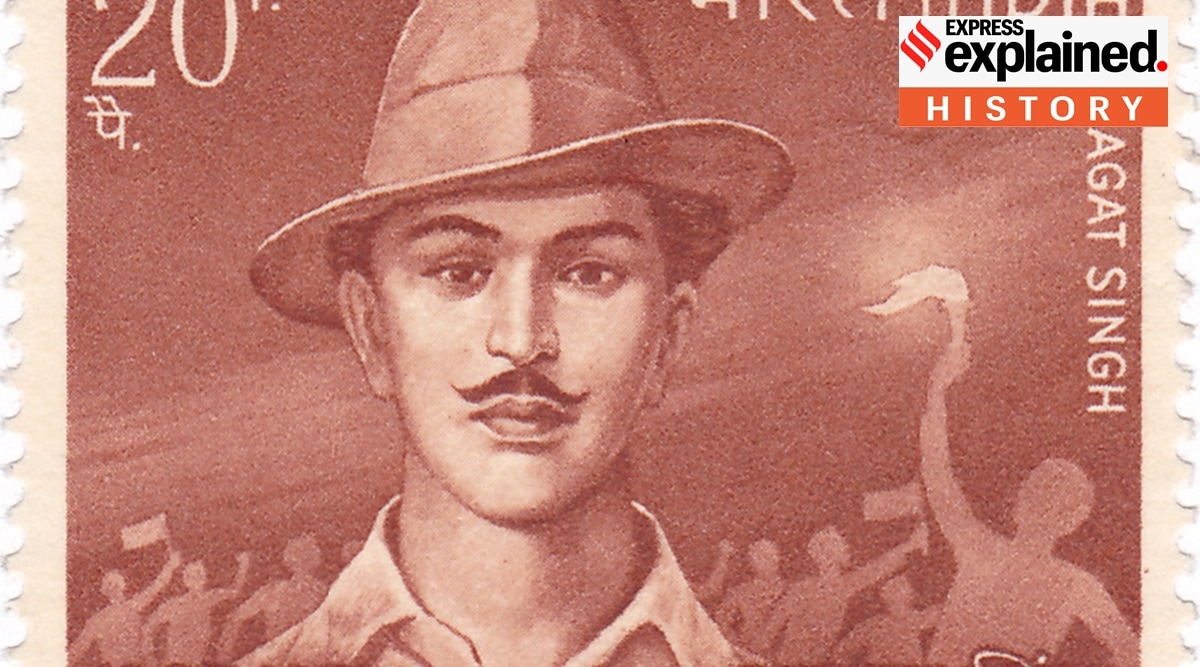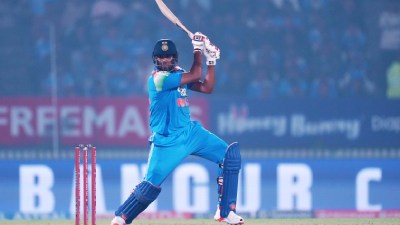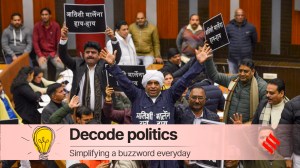Five things you did not know about Bhagat Singh: When Jinnah defended him, Nehru praised him
On his 116th birth anniversary, we remember Bhagat Singh, revolutionary freedom fighter who remains an icon for patriots across India. Here are five lesser-known facts about him.
 Bhagat Singh remains an ubiquitous nationalist icon in India, especially in the northern regions. (Wikimedia Commons)
Bhagat Singh remains an ubiquitous nationalist icon in India, especially in the northern regions. (Wikimedia Commons) Bhagat Singh was born on September 28, 1907 in the village of Banga in Lyallpur district (present-day Faisalabad, Pakistan). A charismatic revolutionary, he was hanged for murdering British police officer John Saunders in 1931, at the age of only 23.
His martyrdom and the coverage his trial received made him a folk hero, especially in northern India. Paeans of his courage and heroism are sung even today, with Bhagat Singh continuing to be an inspiration for patriots across the country. While many freedom fighters laid their lives for India, few have been lionised in popular art and literature as Bhagat Singh.
On his 116th birth anniversary, here are five lesser-known facts about Bhagat Singh’s life.
1. Born into a family of progressive freedom fighters
Both Bhagat Singh’s father Kishan and uncle Ajit were politically active against the British. His father was frequently at odds with the colonial regime and even imprisoned briefly in 1910 for “flooding Punjab with seditious literature”. His uncle was deported to Mandalay in 1907 for his inflammatory speeches and agitation against the Punjab Colonisation Bill. After his release, he headed to Europe and then America, where he was associated with the San Francisco-based Ghadar party.
This meant that from an early age, Bhagat Singh grew up in an environment of anti-colonialism. In Bhagat Singh and His Thought (1990), Hansraj Rahbar wrote that young Bhagat Singh was able to “assimilate nationalist traditions even as he drank his mother’s milk” (translated from Hindi).
Yet, in many ways, Bhagat Singh was — as Chris Moffat wrote in India’s Revolutionary Inheritance: The politics and promise of Bhagat Singh (2019) — “a dissenter from a family of dissenters.” This can most notably be seen in his very public rebuke of his father after he submitted a mercy plea to the Viceroy when his son was facing the gallows. Bhagat Singh chastised old Kishan for his weakness and undermining of the condemned revolutionaries’ cause.
2. A very scholarly person
Today, Bhagat Singh is often remembered as a man of action. Popular portrayals, such as in films like Rang De Basanti (2006) or The Legend of Bhagat Singh (2002), there is an emphasis on his revolutionary activities and muscular nationalism.
However, Singh was as much a scholar as he was a revolutionary. He was a voracious reader and prolific writer who preferred a pen over a pistol in his hand. In the 1920s, he was writing for both Urdu and Punjabi newspapers in Amritsar. He also contributed to pamphlets and other ‘seditious’ literature criticising British colonial rule.
He also wrote for Kirti, the journal of the Kirti Kisan Party and briefly for the Veer Arjun newspaper, published in Delhi. Singh often used pseudonyms including Balwant, Ranjit and Vidhrohi. His jail notebooks reveal not only his social and political concerns, but also the kind of literature he was reading while in prison, which included poetry by the likes of Rabindranath Tagore, William Wordsworth, Wajid Ali Shah, Mirza Ghalib and Iqbal.
3. An atheist and a Marxist
Despite his present-day co-option by parties across the political spectrum, Bhagat Singh was a steadfast atheist and a Marxist with an anarchist tilt.
Criticising religion, Bhagat Singh wrote in ‘Why I am an Atheist’ (1930), “All faiths differ on many fundamental questions, but each of them claims to be the only true religion. This is the root of evil.”
“One of my friends asked me to pray. When informed of my atheism, he said, ‘When your last days come, you will begin to believe.’ I said, ‘No, dear sir, Never shall it happen. I consider it to be an act of degradation and demoralisation. For such petty selfish motives, I shall never pray,” Singh wrote.
He considered the likes of Marx, Lenin, Trotsky and Bankunin as his inspirations. In his final testament, ‘To Young Political Workers’ (1931), he declares his ideal as the “social reconstruction on new, i.e., Marxist, basis”. At the same time, he also did not agree with many orthodox Marxist positions, including those on authoritarianism, that were very fashionable at the time.
In 1928, Singh published a series of articles on anarchism in Kirti, clarifying the meaning of the term for the masses. “The ultimate goal of Anarchism is complete independence, according to which no one will be obsessed with God or religion, nor will anybody be crazy for money or other worldly desires. There will be no chains on the body or control by the state. This means that they want to eliminate: the Church, God and Religion; the state; Private property.”
4. Jinnah eloquently defended Bhagat Singh in 1929
Mahatma Gandhi refused to intervene in the Bhagat Singh trial. As Yashpal, a comrade of Singh later wrote: “Gandhi considered it moral to put government pressure on the people for prohibition but he considered it immoral to put people’s pressure on foreign governments to commute the sentences of Bhagat Singh etc.”
However, he received support from another nationalist giant of the time: Muhammad Ali Jinnah. While as a liberal politician who moved about in high society circles, he was very different from Bhagat Singh, Jinnah nonetheless saw the injustice of the trial he was being put to.
In the aftermath of the Bhagat Singh arrest and his subsequent hunger strike in prison, now stuff of legend, the British attempted to pass a Bill which would make it legal to conduct a trial in absentia — without the presence of the accused. Jinnah stood steadfastly against this, delivering one of his best speeches in the Central Assembly on September 12, 1929.
“The man who goes on hunger-strike has a soul. He is moved by that soul and he believes in the justice of his cause,” he said.
“Jinnah created a profound impression … the Government was sacrificing the fundamental principles of jurisprudence and wanted the House to change the law of the land to create a farce,” The Tribune correspondent wrote at the time (as quoted in The Trial of Bhagat Singh, Politics of Justice by AG Noorani). Eventually, the attempt to pass the law was foiled.
However, Bhagat Singh’s trial went on, under highly dubious circumstances, and he was sentenced to death in 1930.
5. Jawaharlal Nehru also defended Singh and met him in prison
A special tribunal pronounced Bhagat Singh guilty and sentenced him to death by hanging in a 300-page judgement delivered on October 7, 1930. Responding to the judgement a few days later, Nehru was highly critical of the legal process and the injustice being perpetrated by the British.
Explaining Bhagat Singh’s actions, he said: “If England were invaded by Germany or Russia, would Lord Irwin go about advising the people to refrain from violence against invaders?”
While he himself was not fully in agreement with Singh’s methods, Nehru’s respect for him was clear.
“Whether I agree with him or not, my heart is full of admiration for the courage and self-sacrifice of a man like Bhagat Singh. Courage of the Bhagat Singh type is exceedingly rare. If the Viceroy expects us to refrain from admiring this wonderful courage and high purpose behind it, he is mistaken. Let him ask his own heart what he would have felt if Bhagat Singh had been an Englishman and acted for England,” Jawaharlal Nehru told a large crowd that had gathered to hear him speak.
In fact, Nehru even visited Bhagat Singh in prisoner, along with other leaders such as Subhash Chandra Bose, Motilal Nehru, KF Nariman, Rafi Ahmed Kidwai, Mohanlal Saxena, etc.
After the hanging, in an annual Congress session, Nehru moved an official resolution, which was seconded by Madan Mohan Malviya. Despite Congress’s official position decrying any violence, the resolution condemned the execution. It read, “This Congress is of the opinion that this triple execution is an act of wanton vengeance and is a deliberate flouting of the unanimous demand of the nation for commutation”.
- 01
- 02
- 03
- 04
- 05





































